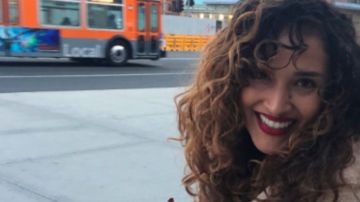How My Curly Hair Taught Me Self-Love
Curly hair is a statement

Photo: Nena Lezama
Curly hair is a statement. It’s an expression and an ode to the women who came before us — to our bloodline. It is an introduction, a presentation, and an affirmation declaring that we know ourselves. We know how to care for ourselves, how to express ourselves, and how to carry ourselves with pride and with boldness. We got roots we’re proud of, we got style, and we are part of a community of predominantly Black and Brown women who wear a crown —our curls.
Today, curly hair conversations flood our IG feeds. There are hundreds of influencers and content on Youtube, blog sites, and even Pinterest. It’s an industry that continues to grow but for us natural curly hair girls, it’s about time. It’s about time we have resources and products that feed and nourish our hair. It’s also about time we have our own aisle in convenient stores and it’s about time our different hair types and textures are recognized by the beauty industry. For some of us, our curly hair journey may have been more than learning how to treat our hair right. For many of us — myself included — our curly hair journey was about learning to treat ourselves right. For me, it was about self-love.
Growing up in Lima, Peru, my curly, light brown hair set me apart from my peers who proudly wore their black, straight hair in braids, pigtails, and ponytails. My light skin set me apart from classmates and often times, I didn’t feel like I belonged. I did not look like the little girls I walked to school with, sat with, and played with. My hair wasn’t long, straight, and shiny. My hair was a lion’s mane. It was wild. I noticed very early on that I did not look indigenous enough. In my young mind, I didn’t understand the effects this realization would have and I didn’t know how the self-hate and internal oppression of my own mother would cause me to misidentify for decades.
And although my mother loved my hair, she would comment that I was lucky because my cheekbones are “graceful” and not “tosca” like those of the Incas, she would say. She would compliment me for having an oval face versus a round one and she would admire my lighter skin tone, constantly telling me that I looked “Americana.” At a young and naive age, I began to believe that looking Peruvian wasn’t good.

Years later, I found myself struggling with my identity while attending school in the states. Both my elementary school and my high school were predominantly white. I remember looking at my skin and hating the caramel and hazelnut tones that complimented my now dark black hair. I remember knowing I wasn’t white and in my mind, to survive, I had to assimilate. I straightened my hair, I dyed it blonde (except it was an at-home dye because my mother couldn’t afford to take me to the hairdressers and it actually came out orange), and I remember trying to avoid facing my curls, my roots, my identity.
It wasn’t until I got out of an abusive relationship that I decided to take my life back. I didn’t chop off my hair, get any piercings, or tattoo my skin (although I already had about 5 tats at that time). What I did was confront myself, I faced myself, I chose to become more me. I soon began to take care of my hair. I began to take the parts of me that my family identified as “European” and brought it back to my roots. I took the part of me that wasn’t Indigenous enough, or white enough and completely owned it. I began looking into what ingredients and products were best for my hair. I found my confidence in knowing that my hair was a tie to the quiet stories my ancestors must’ve taken with them. Every curl holds a memory of my brothers pretending to get lost in them when we were kids, or when my father used to call it “colita de chanchito.” And it reminds me of the comfort I felt when a new boyfriend would see my hair natural and most times, messy. Most importantly, it has helped me contribute and learn from a community of Latinas, Black women, and Afro-Latinas who are shamelessly owning every bit of who they are.

In an era that is so desperately trying to define women, Black women, and brown women, I feel empowered by knowing I’ve taken back who I am because we don’t have to belong. We create our own spaces.
In all fairness, though, I did dye my hair recently and yup, you guessed it. Huge mistake. But like all things strong, my curls will bounce back.

















